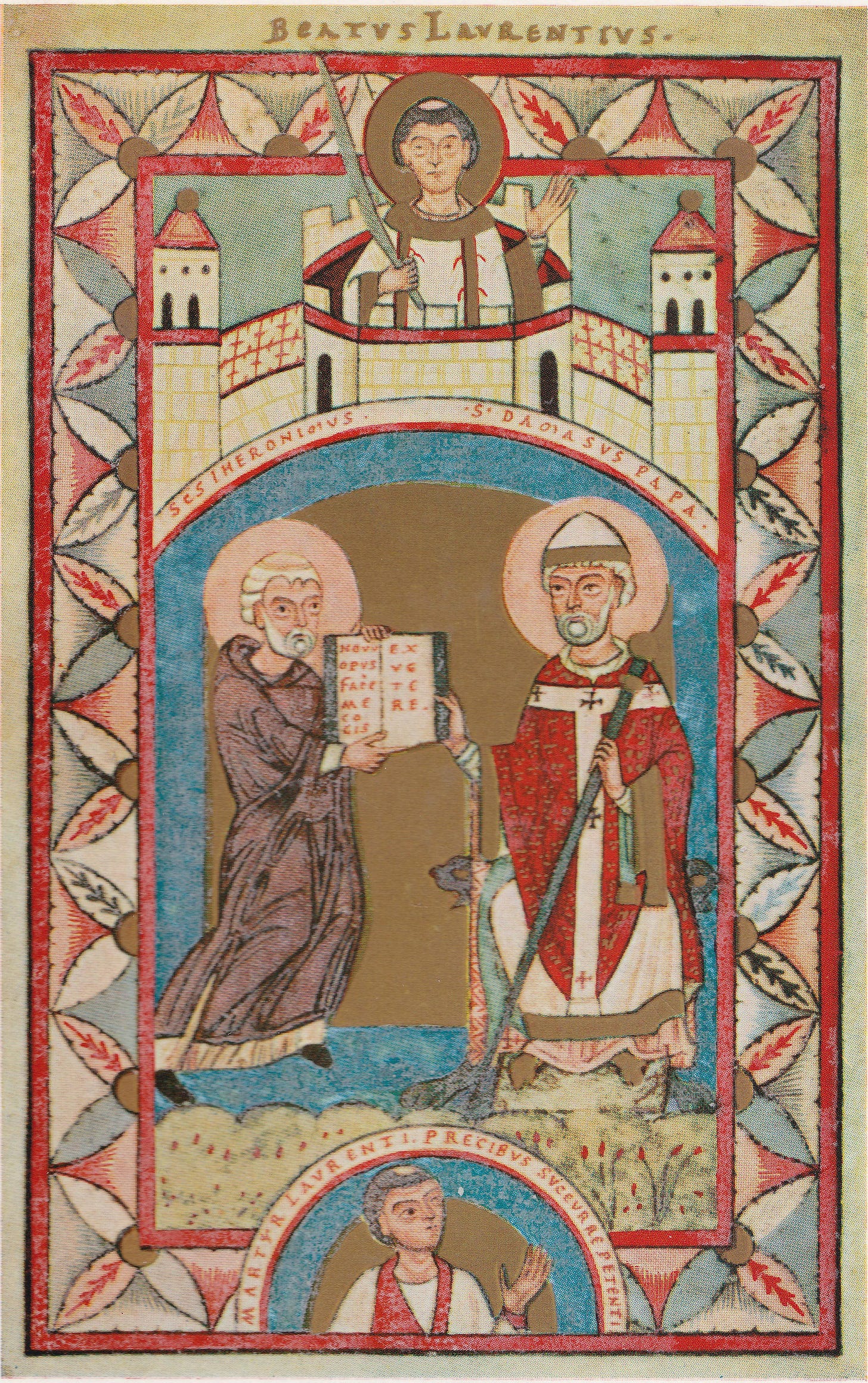Today is the Feast Day of Pope St. Damasus, I
Pray for us.
In an age marked by division, political unrest, and theological disputes, Pope St. Damasus I stood as a beacon of unwavering faith and steadfast leadership. Confronted with schisms, heresies, and the challenges of a fracturing empire, Damasus remained resolute in his mission to preserve the unity of the Church and the integrity of the faith. His ability to navigate these trials stemmed from his unshakeable focus on Christ, the cornerstone of the Church. Whether defending orthodoxy, commissioning the Latin Vulgate, or venerating the martyrs who gave their lives for the Gospel, Damasus exemplified a leader whose actions were guided by a singular devotion to Christ and His Body, the Church. His life reminds us that even in the midst of turmoil, keeping our eyes fixed on Christ enables us to build unity and bring peace to a divided world. St. Damasus, Pray for us.
Pope St. Damasus I: Champion of Orthodoxy and the Latin Tradition
Pope St. Damasus I, the 37th pope of the Catholic Church, served from 366 to 384 during a period of theological upheaval and political instability in the waning years of the Roman Empire. Renowned for his unyielding defense of orthodoxy and his enduring contributions to the liturgical and scriptural foundations of the Church, Damasus left an indelible mark on Christian history. His papacy is especially remembered for his commissioning of St. Jerome to translate the Bible into Latin, producing the Vulgate, a text that shaped Western Christianity for over a millennium.
Early Life and Election
Born around 305 in Rome to a Christian family of Spanish descent, Damasus grew up in a Church increasingly recognized within the Roman Empire. His father, Antonius, likely served as a cleric, offering young Damasus early exposure to ecclesiastical life. As a deacon and priest, Damasus became a prominent figure within the Roman clergy, known for his administrative abilities and commitment to orthodoxy.
The death of Pope Liberius in 366 precipitated a contentious papal election. A rival faction supported Antipope Ursinus, leading to violent confrontations that spilled into the streets of Rome. Backed by the Roman authorities, Damasus secured his position, but the schism with Ursinus continued to trouble his papacy. Despite these challenges, Damasus focused on strengthening the Church’s unity and doctrinal clarity.
Theological Contributions
Defender of Orthodoxy
Damasus confronted heretical movements, including Arianism, which denied the divinity of Christ, and Apollinarianism, which questioned the fullness of Christ’s humanity. Through synods and papal decrees, he reaffirmed the Nicene Creed and protected the Church’s teaching on the Incarnation and the Trinity. His leadership fortified the Church’s resistance to doctrinal error during a tumultuous era.
The Latin Vulgate
One of Damasus’s most significant contributions was his commissioning of St. Jerome to create a definitive Latin translation of the Bible. Aware of inconsistencies among existing Latin texts, Damasus tasked Jerome with producing a translation faithful to the original Hebrew and Greek manuscripts. The resulting work, the Vulgate, became the Church’s standard Bible, profoundly influencing theology, liturgy, and Christian scholarship. Damasus’s vision ensured that Scripture would be accessible and unified for Latin-speaking Christians across the Roman Empire.
Papal Primacy
Damasus vigorously promoted the primacy of the Roman See, asserting its authority as the Church’s central locus of unity and truth. He frequently referred to Rome as the “Apostolic See,” emphasizing its foundation by St. Peter and St. Paul. His efforts reinforced the bishop of Rome’s unique role in guiding the universal Church.
Liturgical and Cultural Legacy
Devotion to the Martyrs
Damasus’s love for the martyrs was clear in his restoration of Rome’s catacombs. He adorned these sacred burial sites with inscriptions celebrating the faith and sacrifice of the early Christians. Many of these poetic epitaphs, composed by Damasus himself, survive today, offering a glimpse into his deep veneration for the martyrs who had shed their blood for Christ.
Liturgical Reforms
Damasus promoted the use of Latin in the Roman liturgy, helping to solidify it as the Church’s official liturgical language in the West. This transition not only united the faithful but also distinguished Western Christianity from the Greek-speaking East, fostering a distinct cultural and theological identity.
Challenges and Triumphs
Damasus’s pontificate was marked by ongoing political and ecclesiastical tensions. The Roman Empire was fracturing under internal and external pressures, and Damasus had to navigate complex relationships with emperors such as Gratian and Theodosius I. Despite these challenges, he remained steadfast in his mission to preserve the unity and integrity of the Church.
Death and Enduring Legacy
Pope St. Damasus I passed away on December 11, 384, and was initially interred in a chapel near the catacombs of St. Sebastian. His remains were later transferred to the Basilica of San Lorenzo. He is a model of pastoral leadership.
His legacy endures through his defense of orthodoxy, his devotion to the martyrs, and his pivotal role in establishing the Latin tradition of the Church. By commissioning the Vulgate, Damasus ensured that the Word of God would resonate in the hearts of the faithful for generations to come. His papacy remains a testament to the enduring power of faith, unity, and fidelity to Christ.
Today’s Mass Collect
Give us grace, Lord, always to celebrate the holiness of your martyrs, for whom Pope Saint Damasus showed such great love and veneration.
Through our Lord Jesus Christ, your Son, who lives and reigns with you and the Holy Spirit, God, for ever and ever.
Thank you for reading The Call to Holiness. This post is public so feel free to share it.



